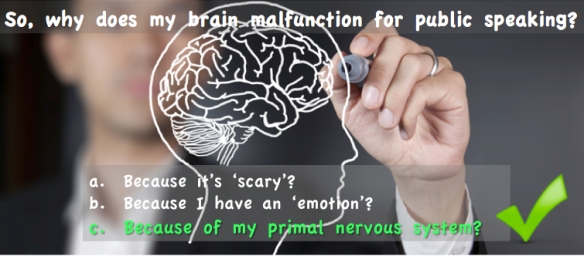CBT for Public Speaking Anxiety
Cognitive Behavioral Therapy (CBT) is an effective method for alleviating anxiety related to public speaking. Public speaking anxiety can be a significant barrier to personal and professional growth.
Many individuals find it challenging to speak in front of an audience due to fear, self-doubt, and excessive nervousness. This anxiety can lead to avoidant behavior or negatively impact performance during presentations. Cognitive Behavioral Therapy (CBT) is a evidence-based approach that helps individuals manage and overcome public speaking anxiety.
Through CBT, individuals can identify and challenge negative thought patterns, develop coping strategies, and gradually expose themselves to speaking situations. This therapy aims to reframe negative beliefs and teach individuals how to manage anxiety symptoms effectively. By working with a trained therapist, individuals can develop the skills and tools needed to confidently engage in public speaking. CBT has been proven to be an effective, long-term solution for public speaking anxiety, enabling individuals to deliver presentations with calmness and confidence. So, if you’re struggling with public speaking anxiety, consider CBT as an effective option to help you overcome your fears and achieve success in your speaking engagements.
Recognizing Public Speaking Anxiety
Public speaking anxiety is a common issue that many individuals face. Cognitive Behavioral Therapy (CBT) is a highly effective approach to help individuals overcome their fear of public speaking and gain confidence in their speaking abilities.
Public speaking anxiety is a common issue that affects many individuals, causing feelings of fear and nervousness when presenting or speaking in front of an audience. This type of anxiety can be overwhelming and have a significant impact on personal and professional life.
If you suffer from public speaking anxiety, it is essential to recognize the signs and symptoms, understand the contributing factors, and explore ways to manage it effectively.
Factors Contributing To Public Speaking Anxiety:
- Lack of experience: Limited exposure to public speaking can contribute to anxiety, as individuals may feel unfamiliar and uncomfortable in this setting.
- Fear of judgment: The fear of being judged by others and the pressure to perform perfectly can intensify anxiety levels.
- Negative self-talk: Having negative thoughts and beliefs about one’s abilities can fuel anxiety. Internal dialogue that focuses on potential mistakes or failures can heighten nervousness.
- Perceived risks: The perceived risk of embarrassment, ridicule, or failure during a presentation can trigger anxiety.
- Previous negative experiences: Past negative experiences, such as being criticized or receiving poor feedback, can increase anxiety levels when facing similar situations.
Understanding The Impact Of Public Speaking Anxiety:
- Professional limitations: Public speaking anxiety can hinder career growth and advancement opportunities that require effective communication skills.
- Academic challenges: Individuals with public speaking anxiety may struggle to participate in classroom discussions, present research findings, or deliver presentations, which can affect academic performance.
- Social implications: Public speaking anxiety can impact personal relationships as individuals may avoid social gatherings or participation in group activities that involve public speaking.
- Emotional distress: Anxiety-related symptoms such as increased heart rate, sweating, trembling, and a sense of dread can significantly impact emotional well-being.
Signs And Symptoms Of Public Speaking Anxiety:
- Physical manifestations: Racing heart, sweating, trembling, dry mouth, shallow breathing, and stomach discomfort are common physical symptoms experienced during public speaking anxiety.
- Cognitive symptoms: Negative thoughts, racing mind, difficulty concentrating, and memory blanks can occur due to heightened anxiety levels.
- Emotional responses: Feelings of fear, nervousness, irritability, restlessness, and a sense of impending doom are common emotional responses associated with public speaking anxiety.
- Behavioral cues: Avoidance of public speaking opportunities, excessive preparation, repetitive behaviors (such as hand gestures or body movements), and speech impairment (such as stuttering or speaking too quickly) may be observed.
Recognizing these factors, understanding the impact, and identifying signs and symptoms of public speaking anxiety are crucial steps towards addressing and managing this issue effectively. In the following sections, we will explore various strategies and techniques to overcome public speaking anxiety and develop confidence in public speaking.
Stay tuned!
Exploring The Cognitive-Behavioral Therapy Approach
Explore how cognitive-behavioral therapy (CBT) can help manage public speaking anxiety. Learn effective techniques and strategies to overcome fear and gain confidence in public speaking situations. Discover the power of CBT in transforming your mindset and improving your presentation skills.
Living with public speaking anxiety can be a daunting experience. The fear of speaking in front of an audience can not only hinder personal growth but also impact professional opportunities. If you find yourself struggling with public speaking anxiety, cognitive-behavioral therapy (CBT) might be the solution you’ve been searching for.
This approach focuses on identifying and challenging negative thought patterns and behaviors, helping you overcome your fear and regain confidence in public speaking situations. In this section, we will delve deeper into CBT and how it can effectively address public speaking anxiety.
Introduction To Cognitive-Behavioral Therapy (Cbt)
CBT is a goal-oriented and evidence-based form of psychotherapy that targets the connections between our thoughts, feelings, and behaviors. It aims to help individuals develop healthier and more adaptive ways of thinking and behaving. When applied to public speaking anxiety, CBT focuses on identifying and challenging irrational thoughts and beliefs that contribute to the fear of public speaking.
By doing so, it allows individuals to develop new coping strategies and improve their overall experience during public speaking engagements.
How Cbt Can Help With Public Speaking Anxiety
CBT can provide individuals suffering from public speaking anxiety with valuable tools and techniques to effectively manage their fear. Some of the key benefits of using CBT for public speaking anxiety include:
- Identifying and challenging negative thoughts: CBT helps individuals recognize their negative thought patterns related to public speaking and challenge their accuracy and validity.
- Replacing irrational beliefs with realistic ones: By challenging irrational beliefs and replacing them with realistic and rational thoughts, CBT helps individuals shift their perspective on public speaking from a fear-inducing activity to a manageable one.
- Developing coping strategies: CBT equips individuals with a range of coping mechanisms, such as relaxation exercises, breathing techniques, and visualization, to reduce anxiety levels before and during public speaking engagements.
- Exposure therapy: Within the framework of CBT, exposure therapy gradually exposes individuals to speaking situations, starting with less anxiety-provoking scenarios and gradually progressing towards more challenging ones. This helps individuals build confidence and desensitize themselves to their fear of public speaking.
Cbt Techniques For Managing Anxiety
CBT offers several effective techniques to manage anxiety associated with public speaking. These techniques include:
- Cognitive restructuring: This technique involves challenging and restructuring negative thoughts related to public speaking. By analyzing the evidence supporting these thoughts and identifying more balanced perspectives, individuals can reduce anxiety and improve their overall confidence.
- Systematic desensitization: This technique involves gradually exposing individuals to their fear of public speaking. Starting with low-pressure speaking situations and gradually progressing to more anxiety-provoking ones, individuals learn to manage their anxiety response and build confidence over time.
- Relaxation techniques: CBT teaches individuals various relaxation techniques, such as deep breathing exercises, progressive muscle relaxation, and mindfulness, to help manage anxiety symptoms during public speaking engagements.
- Skills training: CBT can include skill-building exercises to enhance communication and public speaking abilities. These exercises focus on developing effective public speaking techniques, such as using appropriate body language, maintaining eye contact, and improving vocal projection.
By utilizing these CBT techniques, individuals can address their public speaking anxiety and regain control over their fear, ultimately leading to improved confidence and performance.
Understanding Negative Thoughts And Beliefs
Understanding negative thoughts and beliefs is crucial for overcoming public speaking anxiety through cognitive-behavioral therapy (CBT). By identifying and challenging these negative beliefs, individuals can develop healthier thought patterns that alleviate anxiety and improve public speaking skills. CBT provides practical techniques for changing negative thinking, building confidence, and promoting positive self-beliefs.
Public speaking anxiety can be a crippling fear for many individuals, causing excessive nervousness and distress when speaking in front of others. Cognitive-behavioral therapy (CBT) offers effective techniques to address and overcome this anxiety. One crucial aspect of CBT for public speaking anxiety involves understanding and challenging negative thoughts and beliefs that contribute to the fear.
By identifying and reframing these thoughts, individuals can gain self-empowerment and confidently navigate public speaking situations. Let’s explore the role of negative thoughts in public speaking anxiety and how to address them effectively.
The Role Of Negative Thoughts In Public Speaking Anxiety:
- Negative thoughts play a significant role in exacerbating public speaking anxiety. They trigger intense emotions such as fear, self-doubt, and even panic.
- These thoughts often involve catastrophizing scenarios, imagining worst-case outcomes, and focusing on perceived flaws or criticisms from others.
- Negative thoughts create a vicious cycle of anxiety, as they contribute to increased physiological symptoms like sweaty palms, racing heart, and trembling, further reinforcing the fear.
Identifying And Challenging Negative Beliefs:
- Identifying negative beliefs is the first step towards addressing them. Pay attention to the thoughts that arise when thinking about public speaking and note them down.
- Common negative beliefs may include: “I always mess up when speaking in public,” “People will judge me harshly,” or “My voice sounds terrible.”
- Challenge these negative beliefs by examining evidence to the contrary. Look for examples of successful past presentations or positive feedback from others.
- Ask yourself if these beliefs are based on facts or distorted perceptions. Often, negative beliefs are influenced by irrational thinking patterns, such as mind-reading or overgeneralization.
Reframing Negative Thoughts For Self-Empowerment:
- Reframing negative thoughts involves replacing them with more rational and empowering alternatives.
- Begin by identifying the underlying core beliefs that contribute to negative thoughts about public speaking. For example, the belief that “I must always be perfect” can lead to anxiety and self-criticism.
- Challenge these core beliefs by developing realistic and constructive alternatives. For instance, replace perfectionistic thinking with the belief that “Making mistakes is a normal part of learning and growth.”
- Practice self-compassion and remind yourself that nobody expects you to be flawless. Embrace the idea that every speaker has their strengths and weaknesses.
- Use positive affirmations to reinforce these new beliefs. Repeat statements such as “I am confident and capable of delivering a compelling presentation” regularly.
By understanding the role of negative thoughts in public speaking anxiety, identifying and challenging negative beliefs, and reframing those thoughts for self-empowerment, individuals can make significant progress in overcoming their fear. CBT techniques provide a framework for reshaping the way we think about public speaking, enabling us to approach it with confidence and ease.
So, let’s take the first step towards conquering public speaking anxiety by addressing our negative thoughts and beliefs head-on.
Developing Effective Public Speaking Skills
Developing effective public speaking skills can be achieved through Cognitive-Behavioral Therapy (CBT) techniques tailored for public speaking anxiety. These techniques empower individuals to overcome their fears, build confidence, and learn strategies that enhance their performance in public speaking engagements.
Building Confidence Through Preparation And Practice:
- Identifying the key points of your speech:
- Create a clear outline of your speech to ensure you cover all essential elements.
- Break down complex topics into manageable sections for easier delivery.
- Rehearsing your speech:
- Practice your speech multiple times to build familiarity and confidence.
- Time yourself to ensure you stay within the allotted time frame.
- Record and review your practice sessions to identify areas for improvement.
- Visualizing success:
- Imagine yourself delivering a successful speech to boost your confidence.
- Visualize positive reactions from the audience, reinforcing your belief in your public speaking abilities.
Overcoming Avoidance And Exposure Therapy:
- Understanding the root causes of anxiety:
- Explore the underlying reasons behind your fear of public speaking.
- Recognize and challenge any negative beliefs or past experiences related to public speaking.
- Gradual exposure to public speaking:
- Start with small, comfortable speaking engagements, such as speaking in front of friends or a supportive group.
- Gradually increase the difficulty and size of the audience to desensitize yourself to the fear.
- Utilizing relaxation techniques:
- Practice deep breathing exercises to calm your nerves before and during your speech.
- Incorporate mindfulness techniques to stay present and focused during your presentation.
Strategies For Effective Message Delivery And Body Language:
- Engaging the audience:
- Begin with a captivating opening to grab the audience’s attention and generate interest.
- Use storytelling techniques and anecdotes to make your message relatable and memorable.
- Body language and non-verbal cues:
- Maintain good posture and stand tall to convey confidence and authority.
- Make eye contact with the audience to establish a connection and build trust.
- Utilizing vocal techniques:
- Vary your tone, pitch, and pace to add emphasis and maintain the audience’s interest.
- Practice articulation and enunciation to ensure your message is clear and easily understood.
By implementing these strategies, you can develop effective public speaking skills, build confidence, overcome anxiety, and deliver impactful presentations. Remember, preparation, practice, and gradual exposure are key to conquering your fear of public speaking.
Managing Physical Symptoms Of Anxiety
Learn effective CBT techniques for managing physical symptoms of anxiety during public speaking. Gain confidence, reduce stress, and improve your presentation skills with practical strategies tailored to your needs. Expert guidance to help you overcome anxiety and excel in public speaking engagements.
Recognizing Physical Symptoms Of Anxiety:
- Shortness of breath: During public speaking, anxiety can cause individuals to experience difficulty breathing or shortness of breath. This can lead to a rapid heartbeat and increased feelings of anxiety.
- Dizziness and lightheadedness: Anxiety can also manifest as dizziness or lightheadedness. These physical symptoms can be unsettling and make it challenging to concentrate during a presentation.
- Muscle tension: Anxiety often leads to muscle tension, especially in the neck, shoulders, and jaw areas. This tension can result in discomfort and make it difficult to relax while speaking in front of others.
- Sweating: Excessive sweating is another common physical symptom of anxiety. The fear and nervousness associated with public speaking can trigger excessive perspiration, which can be embarrassing and cause further anxiety.
- Trembling or shaking: Anxiety can cause individuals to experience trembling or shaking of the hands, voice, or other parts of the body. These physical manifestations can be noticeable to others and potentially affect the speaker’s confidence.
Seeking Professional Help For Public Speaking Anxiety
Overcome public speaking anxiety with professional Cognitive Behavioral Therapy (CBT). Gain confidence and develop effective communication skills through targeted therapy sessions. Experience a transformative approach to conquer public speaking anxiety and excel in every presentation.
Public speaking anxiety can be a challenging hurdle to overcome on your own. If you find that your fear of speaking in public is significantly impacting your personal or professional life, it may be time to consider seeking professional help.
Cognitive Behavioral Therapy (CBT) has been proven to be an effective treatment for public speaking anxiety. Below, we will explore when to consider professional help, how to identify qualified CBT therapists, and what to expect during CBT sessions.
When To Consider Professional Help:
- When public speaking anxiety is causing significant distress and interfering with your daily life.
- When you have tried self-help techniques but have not seen any improvement in your anxiety symptoms.
- When you have a high-stakes public speaking event coming up that you feel ill-equipped to handle.
- When your fear of public speaking is affecting your relationships, career, or overall confidence.
Identifying Qualified Cbt Therapists:
- Look for therapists who specialize in anxiety disorders or specifically mention expertise in public speaking anxiety.
- Check the therapist’s credentials and ensure they have the necessary qualifications and licensing.
- Read reviews or ask for recommendations from friends, family, or healthcare professionals.
- Make sure the therapist has experience in using CBT techniques to treat public speaking anxiety.
- Consider scheduling a consultation session to determine if the therapist is a good fit for you.
What To Expect During Cbt Sessions:
- Initially, your therapist will conduct an assessment to determine the severity of your public speaking anxiety and identify any underlying factors.
- You will work together to set specific goals for your treatment.
- CBT sessions will involve discussion, education, and learning techniques to challenge negative thoughts and beliefs related to public speaking.
- Your therapist may use exposure therapy exercises to gradually expose you to public speaking situations while providing guidance and support.
- Homework assignments will be given to practice the skills learned in therapy and reinforce positive behaviors.
Remember that seeking professional help is not a sign of weakness but a brave step towards overcoming your public speaking anxiety. A qualified CBT therapist can provide you with the guidance, tools, and support you need to regain your confidence and conquer your fear of public speaking.
Resources For Public Speaking Anxiety
Discover valuable resources to overcome public speaking anxiety through cognitive behavioral therapy (CBT). Gain practical techniques and helpful tips to build confidence and deliver compelling presentations. Boost your speaking skills today with evidence-based strategies for conquering speech anxiety!
Public speaking anxiety can be a daunting challenge to overcome, but with the right resources and support, you can develop the skills and confidence needed to excel in this area. Here are some valuable resources to consider:
Books
- “The Art of Public Speaking” by Dale Carnegie: This classic book provides practical tips on how to engage and captivate an audience, as well as techniques for managing anxiety.
- “Talk Like TED: The 9 Public-Speaking Secrets of the World’s Top Minds” by Carmine Gallo: Drawing on extensive research, this book reveals the strategies used by some of the most successful TED speakers, helping you deliver impactful presentations.
Websites And Podcasts For Further Information
- Toastmasters International: This global organization offers a supportive environment for improving public speaking skills through structured programs and regular practice sessions. Their website includes helpful resources and a directory to find local clubs.
- The Speaking of Anxiety Podcast: Hosted by a licensed therapist, this podcast addresses various anxiety-related topics, including public speaking. It provides insights, tips, and interviews with experts to help you navigate and overcome speaking anxieties.
- Harvard Business Review: The HBR website features numerous articles and blog posts on public speaking and effective communication. It offers valuable insights from industry leaders and communication experts to refine your skills.
Support Groups And Online Communities
- Anxiety and Depression Association of America (ADAA): ADAA offers online support groups specifically catering to anxiety disorders, including public speaking anxiety. These communities provide a safe space to share experiences, gain support, and learn coping strategies from others facing similar challenges.
- Meetup: This platform allows you to join or start local public speaking anxiety support groups. Meeting regularly with like-minded individuals can provide encouragement, feedback, and opportunities to practice in a supportive environment.
Additional Self-Help Techniques And Tools
- Breathing exercises: Deep breathing techniques help calm nerves and reduce physical symptoms of anxiety. Practice diaphragmatic breathing by inhaling deeply through your nose, holding for a few seconds, and exhaling slowly through your mouth.
- Visualizations: Imagine yourself successfully delivering a speech or presentation. Visualize the positive outcome, vividly imagining how it feels to engage the audience and confidently express yourself.
- Mindfulness and meditation: These practices can promote relaxation and help you stay present during public speaking engagements. Explore mindfulness apps like Headspace or Calm, which offer guided meditations to manage anxiety.
- Practice and preparation: The more you rehearse your speech or presentation, the more confident you will feel. Practice in front of a mirror, record yourself, or seek feedback from trusted individuals to improve your delivery.
- Professional Help: If public speaking anxiety severely impacts your life, consider seeking professional help from a therapist or counselor. Cognitive Behavioral Therapy (CBT) has shown promising results in addressing anxiety disorders, including public speaking anxiety.
Remember, conquering public speaking anxiety takes time and patience. Utilize these resources and techniques consistently to build your confidence and become a compelling speaker.
:max_bytes(150000):strip_icc()/GettyImages-1341307405-b3cd071e0cdc4c399f63048d48cdc074.jpg)
Credit: www.verywellmind.com
Frequently Asked Questions On Cbt For Public Speaking Anxiety
How Can Cbt Help With Public Speaking Anxiety?
Cognitive Behavioral Therapy (CBT) helps with public speaking anxiety by addressing negative thoughts and beliefs, teaching relaxation techniques, and gradually exposing individuals to speaking situations. It helps in changing the perception of public speaking and building confidence through problem-solving and skill-building exercises.
What Are The Common Symptoms Of Public Speaking Anxiety?
Common symptoms of public speaking anxiety include increased heart rate, sweating, trembling, dry mouth, difficulty breathing, and feeling nauseous. Additionally, individuals may experience racing thoughts, negative self-talk, and intense fear of being judged or embarrassed in front of others.
Can Cbt Be Effective In Overcoming Public Speaking Anxiety?
Yes, CBT can be highly effective in helping individuals overcome public speaking anxiety. By identifying and challenging negative thoughts, developing coping strategies, and gradually exposing individuals to speaking situations, CBT can help individuals build confidence, reduce anxiety, and improve their public speaking skills.
Is Public Speaking Anxiety A Common Problem?
Yes, public speaking anxiety is a common problem and affects many individuals. It is estimated that up to 75% of people experience some level of anxiety when speaking in public. However, with the right techniques and support, this fear can be managed and overcome.
Conclusion
Cognitive Behavioral Therapy (CBT) has proven to be an effective treatment for public speaking anxiety. By addressing the negative thoughts and beliefs associated with public speaking, CBT helps individuals reframe their mindset and develop more confident and positive thinking patterns.
Through practice and exposure, CBT empowers individuals to challenge and overcome their fears, allowing them to effectively communicate and engage with others in public speaking situations. CBT techniques, such as cognitive restructuring, relaxation exercises, and systematic desensitization, provide practical strategies for managing anxiety and improving overall performance.
It is important for individuals experiencing public speaking anxiety to seek professional help from a licensed therapist trained in CBT. With the right support and guidance, individuals can successfully overcome their fear of public speaking and experience increased confidence and success in their personal and professional lives.
Remember, don’t let anxiety hold you back – explore the benefits of CBT and take control of your public speaking fears today.





